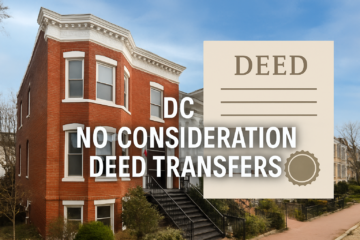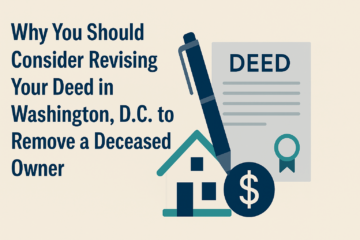Estate planning is more than just a will; it’s a comprehensive strategy that ensures your assets are managed and distributed according to your wishes. A critical component of this process is deed preparation. In this blog, we’ll explore the significance of deed preparation in estate planning and why it’s essential for a seamless transition of property ownership.
Understanding the Importance of Deeds
Deeds are legal documents that signify ownership of a property. In the context of estate planning, they ensure that your real estate is transferred to the right beneficiaries. Without properly prepared deeds, there can be uncertainty and disputes about property ownership after your demise. A deed is not merely a piece of paper; it is the foundation of property rights and a significant component of estate planning. It is essential for individuals to appreciate the role of deeds to grasp why meticulous preparation matters so much. A well-prepared deed is akin to a guardian of your property wishes—a document that can prevent potential disputes and ensure a smooth transaction.
A common misconception is that estate planning begins and ends with a will—far from it. Real estate deeds in estate planning are critical as they dictate the flow of real estate ownership. The absence of a deed or improper deed formalization can lead to probate—a lengthy and complex legal process. A probate can delay property transfers, deplete estate assets through court fees, and leave beneficiaries in limbo, negating the intentions behind estate planning. Hence, deed preparation is not just an element of estate planning but rather its backbone.
Types of Deeds in Estate Planning
Several types of deeds can be used in estate planning, including warranty deeds, quitclaim deeds, and transfer on death deeds. Each type serves a unique purpose and comes with its own set of implications in terms of taxes, liability, and ownership rights. Using trusts in estate planning often involves understanding which deed best fits your strategy. For example, a warranty deed provides guarantees that the title is clear, offering peace of mind for beneficiaries. Conversely, a quitclaim deed may suffice for intra-family transfers where trust and simplicity are paramount.
The quitclaim deed, while seemingly straightforward, carries its own set of nuances worth noting. It is often chosen for its simplicity but lacks the guarantees that a general warranty deed offers. Despite its name, a quitclaim deed does not necessarily quit the ownership claim—it merely transfers whatever interest the grantor holds, with no assurances of clear title. Thus, choosing the appropriate deed type is not only about the present moment but also about safeguarding the future against claims and disputes. Seeking guidance on the right deed can prevent unforeseen complications. If you’re in Maryland, exploring deed preparation with local experts can offer tailored advice.
The transfer on death deed is another useful tool in estate planning. Unlike the other deeds, this one allows for property transfer without probate, effectively granting ownership upon the owner’s death, simplifying the process for the beneficiaries. This deed type exemplifies how planning today can ease tomorrow’s transitions. As with the embodiment of simplicity and foresight, this deed exemplifies how a deed can help manage estate complexities effectively. As estate planning evolves, incorporating modern tools like this can ensure that your intentions are seamlessly carried out.
The Process of Deed Preparation
Deed preparation involves several steps, including drafting, reviewing, and signing the deed. It’s vital to ensure that all necessary information, like the correct property description and names of parties involved, is accurately included to avoid any legal issues down the line. With accurate deed preparation, one can bypass many common hindrances associated with estate disposition. A misplaced comma or an incorrect property line in the deed can lead to significant challenges. The drafting process demands not just attention to detail but also an understanding of legal terms and implications. This is where professional expertise can add significant value. Reviewing the deed carefully, sometimes more than once, is a crucial step, followed by ensuring proper signing by all parties involved.
Errors in deed preparation can have far-reaching effects. Once a deed is improperly executed, remedying these errors can be cumbersome, requiring court interventions, amendments, or even the execution of a new deed. Consider the arduous journey of untangling title defects: it is effortful and time-consuming, drawing resources and attention away from more pressing concerns. Regularly, individuals underestimate the need for meticulous deed preparation until faced with a hurdle post-execution. Protecting your assets and intentions starts with getting this step right, ensuring a seamless transition to the next generation.
Common Mistakes to Avoid
Inadequate deed preparation can lead to a host of problems. Common mistakes include incorrect property descriptions, misspellings of names, and not recording the deed correctly. Awareness of these pitfalls can save time, money, and distress. Imagine the frustration of discovering an oversight when it’s too late—like an error that leads to disputes or financial loss. Such issues underscore why diligence can’t be overstated. Moreover, not consulting with a legal professional while preparing these documents is a frequent oversight that can cost dearly. Engaging an attorney can help you navigate the legal lexicon and ensure all aspects of the deed align with your estate plan.
Failure to account for future contingencies like remarriage or the birth of additional heirs is another potential oversight. Estate planning is not a static process; it evolves with life circumstances. When preparing deeds, one should factor in possible future scenarios to prevent having to redo or modify deeds repeatedly. It’s wise to envision the broader landscape of your estate and consider possible changes. Incorporating flexible clauses within the deed, where applicable, can accommodate shifts in circumstances, maintaining the integrity of your estate plan.
How a Lawyer Can Help
Hiring an experienced estate planning attorney can simplify the process. They can provide invaluable assistance in ensuring that all legal requirements are met and that your deeds are properly drafted, minimizing any risk of future disputes. Lawyers bring a wealth of experience and knowledge that can translate into peace of mind for you. They not only draft and verify deed legality but can also spot inconsistencies or issues that a layperson might overlook. Furthermore, attorneys can offer advice on more complex scenarios, such as deciding when a trust is beneficial for holding your property.
Moreover, legal counsel can offer strategic advice beyond the mere preparation of deeds. For instance, they can help determine if placing your property in a trust aligns best with your estate goals. They facilitate with navigating the intricacies of estate law, offering solutions and strategies to maximize exemptions and benefits. When a specialized situation arises, such as a transfer involving land with environmental encumbrances or a multifamily structure, the expertise of an estate planning attorney can be indispensable. Discussing your options with experienced professionals can lead to the most effective outcomes.
Securing Your Legacy Through Proper Deed Preparation
Deed preparation plays a pivotal role in estate planning, providing clarity and security for your loved ones. By taking the time to prepare deeds properly, you ensure that your property is distributed according to your wishes, reducing the potential for disputes and complications. As you plan for the future, consider consulting with an estate planning professional to guide you through the intricacies of deed preparation for peace of mind.




0 Comments